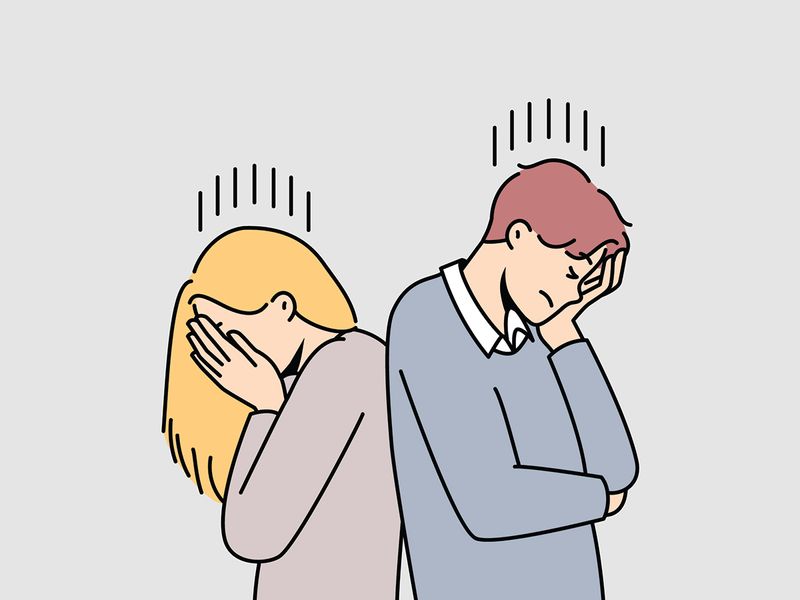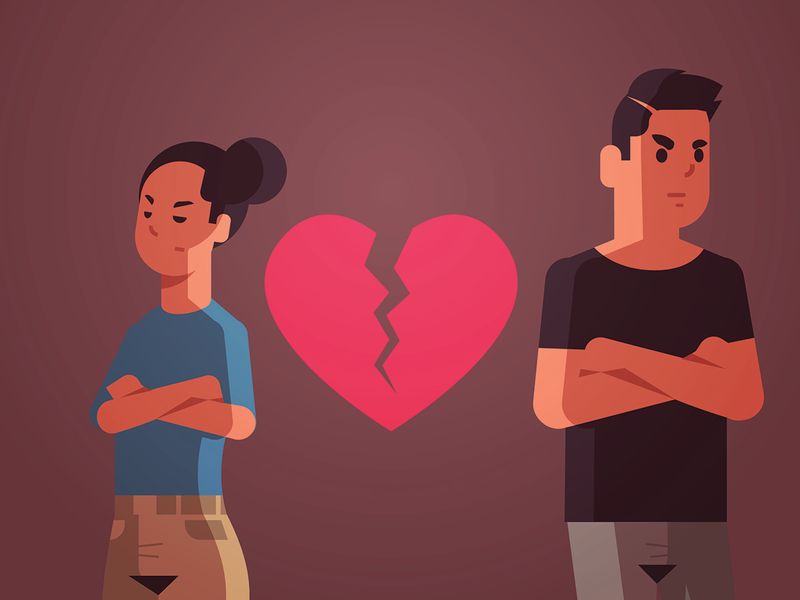
When is it time to let go? When do you know that you must hold on?
There’s no guidebook for relationships, as Dubai-based Abhinav Singh (name changed on request) says. He thought that his love story was one for the books: Met someone, fell in love within months, and married her, the next year. However, it was a “terrible” wedding as he says; fights had already broken out between her and his parents. As a result, his parents kept away from the wedding. “I went along with the wedding without my parents, and that was my mistake,” he agrees.
A home built on brewing anger and fragmented relationships isn’t a home, as he admits. In a year, they discovered that every fight seemed to threaten the end of the relationship: From household chores to walking the dog, to major crises like job changes, as his company shut down. “We tried talking it out many times, but she got her mother involved in the arguments, who obviously took her daughter’s side,” he says.

And so, a marriage of ten months ended in a rather bitter separation and an ensuing divorce case. “Sometimes, you just know when to let go. There’s no point in living in a home filled with fights and pain,” concludes Singh.
Yet, for Anna Ponsford, a Dubai-based British expat, she didn’t let go. After months of difficult fights, arguments with her husband that involved both their families, the couple have finally reached a peaceful place in their relationship. “We started again from scratch,” as she says.
So, how do you make a distinction between a relationship that has already met its end and one that can still be salvaged?
It’s not so easy, as psychologists explain.
‘Relationships are deeply tricky’
As humans, we’re hardwired to connect. However, relationships are a complex and messy game, as Gurveen Ranger, psychologist at Sage Clinics says. People have different meanings and expectations for others, based on their own personal experiences, values and perspectives.
“What influences a decision to give up on a relationship is different from one person to the next and again be quite subjective,” she says. There are people who will instantly end a relationship as soon as something goes wrong. They do it as a means of protecting themselves; a manner of minimising the opportunity to be hurt again. There are also others, who will stay in an unhealthy relationship for longer than they should. “It is what they know, and what they have come to expect. Familiarity means comfort, and no matter how unhealthy the behaviours within that frame might be,” she says.
Identifying the patterns of an unhealthy relationship

Abusive patterns, disrespect, and neglect: The signs that you’re in a harmful relationship, as the psychologists explain. You will find yourself having the same argument repeatedly, with no solution.
“It’s when the basic principles of mutual respect and care are absent,” explains Devika Mankani, a Dubai-based psychologist. It’s also when a person is sure that there is nothing that can be done to salvage it; they can’t let go of their own hurt. Given relationships are based on personal and subjective experiences, it is important that differences are understood and respected by the other, as this is essential for healthy, balanced, and meaningful relationships to work, explains Ranger.
Some signs that a relationship is or has become unhealthy include:

Lack of communication: There are several ways that this can pan out, says Ranger. There may be a complete breakdown of communication where two people stop talking at all. The conversations remain at the surface and are unfulfilling. On the other hand, the conversations are just argumentative or critical in nature, where both sides feel unheard and misunderstood.
Lack of respect and trust: Words can really sting, burn, and scorch a person, as the psychologists explain. Belittling comments, dismissing feelings or a disregarding feeling lead to a build-up of hurt and resentment. Your boundaries feel violated, and neither are you able to communicate clearly to the other person. Jealousy is also equally harmful; it presents a lack of trust, along with excessive suspicion and possessive behaviours, adds Ranger.

There may be a misalignment of values and goals or future plans, which may fuel dissatisfaction too. Two people with different value systems and goals can sustain a healthy relationship, if there is an understanding of what is important for the other and space is given to co-exist...
Unbalanced power dynamics: This can show up in multiple ways. Problems start arising where one person holds all the decision-making abilities, which generates further resentment. “There may also be a loss of autonomy or independence and greater isolation if one person in the relationship is overly dominant or controlling of social interactions and behaviours,” explains Ranger. These imbalances can represent an abusive relational dynamic.
Moreover, the relationship can also turn emotionally abusive, which is harder to spot. This could be seen as inducing guilt in the other person, which is now referred to as gaslighting. “You’re making someone doubt their own perceptions, memories or sanity, or blaming them for something that wasn’t their fault,” says Ranger.
Differences in values and goals: For some relationships, both partners may feel consistently unhappy or unfulfilled within the relationship. “This may be a sign of drifting apart, and staying together for other reasons may signal an unhealthy relationship,” says Ranger. There may be a misalignment of values and goals or future plans, which may be fuelling this unfulfillment too. Two people with different value systems and goals can sustain a healthy relationship, if there is an understanding of what is important for the other and space is given to co-exist.
Normalising unhealthy patterns

And, so they normalise most of these unhealthy behavioural patterns in their relationship and convince themselves that the problems are just signs of disagreements and challenges, explains Lisa Connelly, an American Dubai-based relationship therapist. “You’ll see people defending terribly toxic patterns of abuse in their relationship, saying that it is just a natural fight,” she says.
As Connelly explains, these unhealthy patterns can develop for multiple reasons over time: Unresolved bitterness regarding old stinging issues, personal disappointments and projecting them on another person. It’s also when the differences in two personalities just becomes entirely too glaring and you’re hit with the realisation that it cannot be solved. “In that case, neither party has the courage to walk away. So, they’ll stew in that unpleasantness, knowing that there is nothing left, yet convincing themselves and others that they don’t want to walk away from a commitment,” she says.
Yet misery is corrosive, and finally you just have a toxic atmosphere at home. “It wears you down psychologically and you tend to seek out more unhealthy habits as a manner of coping,” adds Connelly.
Can you work on a frayed relationship?
Not all relationships with unhealthy patterns need to reach a dead end. Sometimes, after time and reflection, couples can find a way to rebuild trust and heal a battered past.
Geetanjali Das, a Dubai-based teacher, a mother to a 14-year-old daughter, divorced her husband 10 years ago. He was too busy trying to make a career for himself and she was suffering from a deep loss in her family. Distances widened between them; she was convinced that he was not emotionally present for her. It became a relationship fraught with bitterness. “I felt alone in a new country and thought that he wasn’t there enough. We fought and hurt each other so much,” she recalls. "We divorced and just saw each other on weekends, where he would take our daughter out.”

Three years ago, the frigid cordiality ebbed away, replaced by friendliness. They started talking about the past. “We just talked and talked every day. Both of us apologised for how we had behaved, earlier and for making the relationship so toxic,” she says.
Trust was rebuilt, and a year ago, they remarried. “It took a while to understand each other,” she acknowledges.
As Connelly points out, the unhealthy markers of a relationship need not always mean the end. There is a chance that it can still be salvaged. However, this takes a lot of discussion, forgiveness, understanding and compassion on both sides. “It’s not always so black-and-white about just walking away or staying on. You might see unhealthy patterns, but many a times, you need to see whether it can be healed - whether you really want it to be healed. That’s the most important part. It depends entirely on the mental make-up of the person,” she says. Maybe it just needs time and a lot of effort.

The relationship stands a chance when two people are committed to doing the work, are willing to put in the effort to understand how they got to where they are and be able to grow together...
For that, the couple need to look inwards and see how trapped they are in their own cycle of indifference or hurt and anger. They need to introspect on the damage that they have inadvertently caused each other, and whether they can move on from it, she adds. If the issues have built up overtime, the couple will find it far more difficult and exhausting to untangle and unpack; they might give up halfway., especially if they continue to have the same arguments over and over again, explains Sneha John, a Dubai-based psychologist, from Dubai-based Medcare Camali Clinic.
“The relationship stands a chance when two people are committed to doing the work, are willing to put in the effort to understand how they got to where they are and be able to grow together,” adds Mankani. There needs to also be a genuine determination to work on it; there must be common understanding of love and trust, or at least a desire to make the relationship a safe space again. “You need to have the grit to make it work,” says John. “Both sides need to make apologies, so that wounds are soothed, and the healing process can at least begin,” she says. Sometimes, starting from scratch is the only way to work on reviving that feeling of love and safety.

Both sides need to make apologies, so that wounds are soothed, and the healing process can at least begin. You need to have the grit to make it work, only then, is there a chance of reviving that feeling of love and safety...
However, if either party is unwilling to change their problematic patterns or wounds have run too deep and they can’t work on the relationship, this compromises their well-being completely, it’s better to walk away, as Mankani agrees. “A balanced and healthy relationship encourages personal growth and change, and when this is blocked, it can affect a person’s decision to stay in the relationship,” she says.
Moving beyond the fantasy
Charlotte Spurway, a Dubai-based psychologist also provides a different perspective. As she says, the beginning or "honeymoon" phase of a relationship is so enticing, that people struggle when faced with actual difficulties. "There's the ideal phase. This is the initial part when everything is wonderful. You believe they are perfect for you. However, as you start spending more time together, you start noticing flaws. This is the ordeal phase, where everything gets messy. The relationship may feel shaky, and it may seem like this for a while," she explains.

It feels safer to live in a fantasy, to keep dreaming rather than submit to the vulnerability and uncertainty of the relationship we are in. That takes risk. True relationship requires risk, true vulnerability and truly getting out of your own head. It involves letting go of fears...
If you keep believing in this fantastical idea of a partner, you will never make it through this phase. You will keep jumping ship and finding that ideal phase, as the ordeal phase seems too tiring and exhausting for you," she says. What you also need to understand is, that that the ideal partner doesn't exist and a real relationship can also be born from the imperfections. Yet, people keep repeating this pattern, as they fear intimacy, real love and committment. It feels safer to live in this fantasy world, than to actually come to grips with reality. It also takes risk and effort, that people aren't always willing to do.












